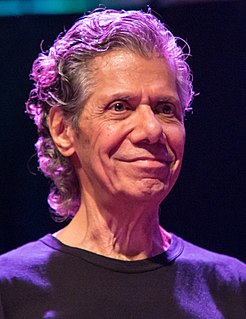Top 39 Quotes & Sayings by Chick Corea
Explore popular quotes and sayings by an American musician Chick Corea.
Last updated on December 21, 2024.
My dad was all about music. He was a musician, leading a band when I was born. His band was active all through the 40s. He'd started it in the late 20s and 30s. According to the scrapbook, his band was doing quite well around the Boston area. During the Depression they were on radio. It was a jazz-oriented band. He was a trumpet player, and he wrote and arranged for the band. He taught me how to play the piano and read music, and taught me what he knew of standard tunes and so forth. It was a fantastic way to come up in music.
As a musician, I don't have one thing that's "my thing." I like to create, and have a lot of outlets for it. Dustin Hoffman is one of the guys that sets a model for me, because of how good he is at being such different characters. Every time you see DeNiro, he's pretty much DeNiro - great, but DeNiro. Hoffman is different every time, depending on his character. That's how I see myself as a performer.




















